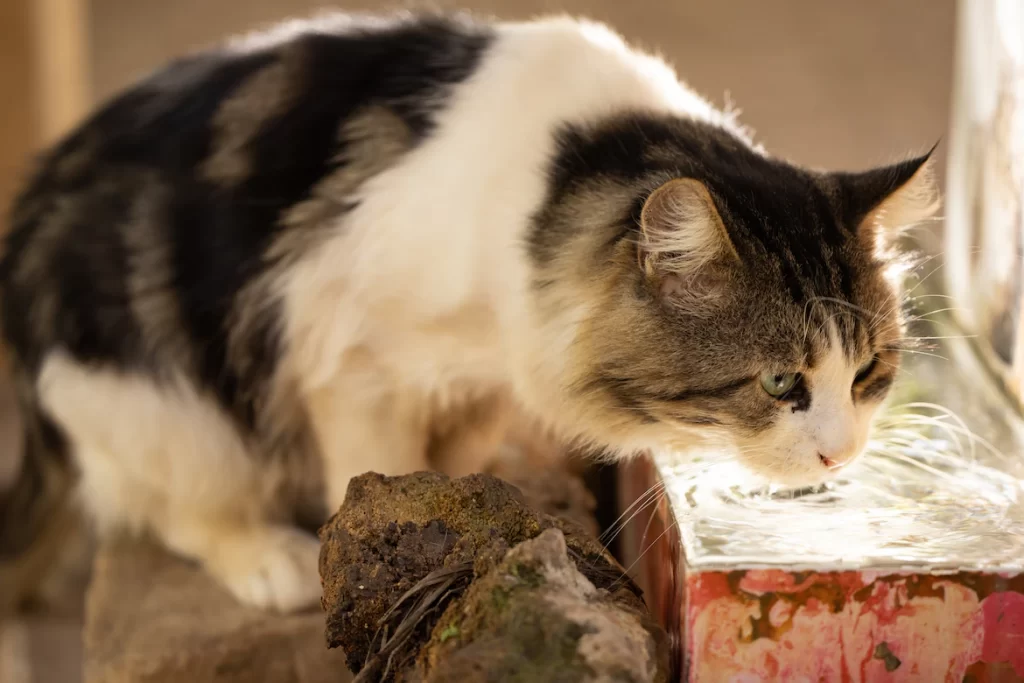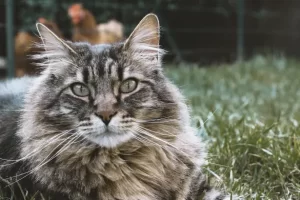Last updated on February 5th, 2023 at 05:52 pm

Introduction
Why don’t cats like water? Cats are one of the pets that many people live with at home. They are always known to hate water so much that they cannot even withstand living in an environment full of water. However, not all the cats we keep in our homes fear water. The fact is that majority of known cats hate water due to many reasons. Therefore, the question of why cats don’t like water has numerous responses based on the cats’ ancestry. Keep reading this article to discover why your cat may normally swim in water like other pets.
According to Anna Ewers, a veterinary researcher based in the United Kingdom, cats lived in a very dry environment throughout their history. The desert environments made the cats less adapted to many activities involving water, such as swimming or bathing.
Anna Ewers takes this trait as an easy explanation as to why cats don’t like water. However, that was not only the research available concerning the matter. Many other people also conducted their research on why cats hate water and came up with unique responses. For instance, Celia Haddon, an author and cat expert, also carried out research on the matter.
In the research, Celia Haddon focused on many possible reasons cats don’t like water and came up with a unique response. According to Haddon, domestic cats have their ancestral root originating from the small cats that lived in desert areas many years ago. The wild cats commonly lived in dry deserted areas with no rainfall and water. For this reason, the carts adapted to the dry paws and strong sunlight and like staying in warm areas. However, being that most cats hate water does not necessarily mean that they can get affected by water. For instance, when your cat falls in water accidentally or when planned, this does not mean the cat will die or get injured.
Cats know how to swim perfectly when on water. Therefore, your cat will steadily swim like other pets and move out of the water. Their swimming skills are meant to rescue them from water as they do not enjoy the environment in water like other pets. Apart from the ancestral heritage, there are also some reasons why cats don’t like water. These reasons are based on the lifestyle of the cats from how they maintain their hygiene and scent. For this reason, there is still more to talk about that will make you understand why your domestic car fears coming into contact with water at home.
Why Don’t Cats Like Water?
Naturally, cats use their nose a lot to understand the environment they live in at home. Therefore, when the cat gets wet, the water can lead to a loss of scent. The cats depend on their scents so much, which can help them notice some chemicals available in water that no human can see with naked eyes. The cats are therefore believed to have noses that are more sensitive than that of dogs or humans. The sense of smell, also called olfaction, is the main smelling method cats use to analyze the surrounding environment.
The sense of smell in cats is also essential for their communication, predator detection, hunting, and the cat’s sense of identity. In addition, the high sense of smell in cats makes them able to sniff out bombs, medical odors, and drugs. According to research, cats, like other mammals, has their nose containing scent receptors. It is these scent receptors that make them able to differentiate scents. The protein variant that helps in scent analysis is called the VC1. Cats have the highest number of these proteins with a total number of 30 VC1 proteins, while dogs have nine and humans only have two. So, you can figure out how many times the nose of the cat may be sensitive to the nose of the human being according to the number of VC1 proteins each has in the nose.
Because water always has many chemicals dissolved in it with other organic matter. Cats can easily sense these toxic chemicals more than you can. For this reason, they will prefer to avoid the water as much as possible to reduce their exposure to the chemicals. In most cases, they will avoid the water to avoid being contaminated by any smell that is unnecessary to them. They also spread their scent to the house, especially humans or furniture, by rubbing themselves on their bodies. They are not always very keen on washing off their scent after rubbing.
Why do cats dip their toys in water?
Despite cats hating water, most of them like dipping paws into a fishbowl or water. According to Clark’s explanation of cats dipping their toys in the water. He says that most cats practice putting their toys into the water to discover the great fun it could be, and that is when they drop the toy knowingly or by accident. For this reason, it becomes something that entertains the cats despite the fear of water and is a novel experience that most researchers learned in almost all cats. Once the other side, Haddon explains the same scenario by saying that it is a way in which cats get a chance to hunt out their toys in the form of play games. He continues further by stating that the desires cats have for hunting their prey, in most cases, overcome their hate for water.
To test this with your domestic cat at home, you can pop its favorite toy into a sizable bowl full of water. Then sit back and watch the cat trying to dig the toy out of the bowl; it is a better way of activating the instinct of their predator. Even though the cat will be afraid of getting wet, the presence of water will not stop them from enjoying the game with the fishbowl. There are also many other reasons why cats don’t like water; these following reasons include:
Getting wet makes the cat weigh down
When dipping a cat into a bowl full of water, it may seem like carrying a blanket soaked in water into your shoulders until it gets dry up. The blanket will be heavier when wet. This same principle happens in cats; they will feel more weight when their fur is completely drenched. The increased weight will make the cat uncomfortable to move normally.
The evolutionary history of the cats
As stated earlier, the ancestors of cats lived in desert areas making them less adapted to wet areas. This makes the modern cat fear water despite the evolution from wild cats to domestic cats. Therefore, preparing the modern cat to develop a love for water like other pets may sometimes not be practicable due to their evolution. Their reaction toward water tells more about their fear of water and may not easily develop an interest in it like water.
Poor control
Unlike other pets, cats lack control of their body when dipped into the water. Despite being able to swim in the water, they will not easily control themselves when inside water. For this reason, the cats will avoid getting into the water as much as possible, even if they are playing with their toys dipped in water. When standing outside the bowl full of water, the cat will fully control themselves even if they are playing with toys inside the bowl. The cats prefer sitting on dry land when playing near water to make them easily go away whenever they like.
Negative attitude towards water
Some cats may like bathing or playing in the water while still in their kittenhood. However, as the cats grow old, they start developing a negative attitude towards water. The cats will have stressful experiences when submerged in water at an adult age, making them hate water. This happens when the cats fully control themselves and can make decisions after experiencing the bathtubs.
The sense of smell in cats
Cats have the highest sense of smell, which is most reliable than any other pet. For this reason, the cat will be able to detect any chemical or strange substance dissolved in water that even human beings cannot detect. Their highly sensitive nose will easily sense and distinguish the available water components that make the cat avoid the water, especially if they are not comfortable with the smell. Therefore, if your cat hates water, it may not necessarily mean the pet fears getting wet. The cat will be able to detect and notice the presence of any toxic substance in the water that you cannot smell unless you carry out a laboratory test. For this reason, you need not force the cat into the water; just let the pet go away.
Which cat breeds like water?
Some breeds are comfortable staying in wet areas or playing with water despite cats hating water. According to research by Johnson Bennett, the breeds of cats with no hate for water include the Bengal, Savannah, Turkish van, and the Maine coon cats. Most people who keep the Turkish van breed describe the cat as the swimming cat. Turkish van cats have some adaptations that make them unique from the average cats. For instance, this cat breed has a waterproof coat that allows them to hold water. This makes swimming easy and enjoyable for the Turkish van cat. Their desire to be in the water often makes the owners search for cat pools.
This explains why this breed of cat was named a swimming cat. When looking at the cats loving the water, it is more on the cat’s personalities and the unique adventure the pet has when exposed to water. Therefore, the fact that these breeds of cats are more water resistant than the average cat may not necessarily mean that they will stay in the water.
Can a domestic cat be trained to like water?
This is a question everyone would like to know, especially if you have a breed of cat that doesn’t like water at home. However, this is almost an impossible task unless the cat develops an interest in being exposed to water. Therefore, if you want to make your cat love swimming in water at home, you need to know how much the cat dislikes coming close to water. If the cat is not interested in playing in the water, the best thing is to let your cat continue avoiding the water as much as possible. There are many things that your cat will like if you train them rather than training them to overcome their hate for water. According to Haddon, training the cat to like water is not ethical.
This also makes it unnecessary to wash your cat, as many people do. In most cases, cats always look hygienic, clean, and attractive despite their fear of water. Cats rarely get dirty, unlike other pets such as dogs, which get dirty easily when playing. Bathing your cat at an adult age can sometimes dry up the pet’s skin. If the breed of the cat you have requires periodic bathing, you can only do so when they are still a kitten. However, when the cat grows old, it is important to hire a professional groomer to help you in bathing the pet. The groomer or even a veterinary clinic expert will have more ideas on how the cat can be bathed safely without causing any problem to its body.
Conclusion
Unlike other domestic animals, cats have the greatest fear of water. For this reason, you will rarely find them playing in the water or even near water. Despite the cat being able to swim, they prefer to stay away from water as much as possible. Therefore, the nature of cats avoiding water may not be news to people who live with the cats at home. The reason why cats hate water is personal and may not necessarily affect other pets such as dogs. For instance, the ancestral background and the scent smell of cats are some of the personal reasons that make them avoid water but are not a challenge to other pets. Therefore, it is important to understand and respect the nature of your cat. Now you have sufficient reasons as to why don’t cats like water.


